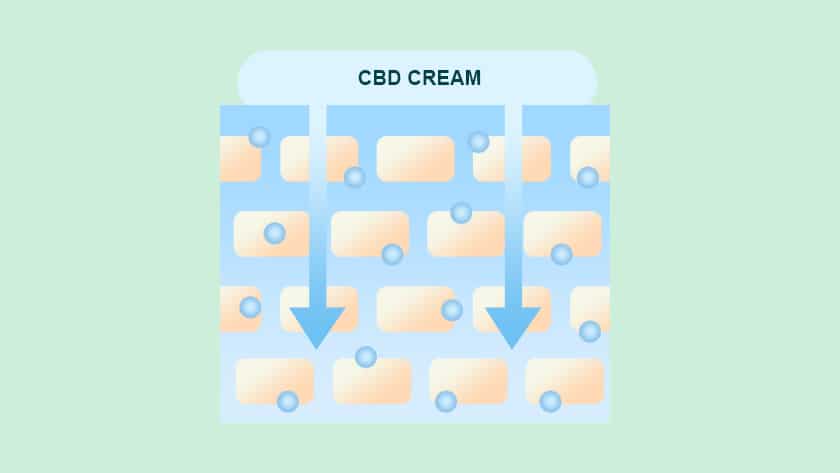
When you apply Topical CBD to the skin the CBD is absorbed by cannabinoid receptors through your skin pores. Biologically, these receptors are part of a complex system in which cannabinoids are used to regulate balance within the body. This system is known as the Endocannabinoid System (ECS).
Your Skins Endocannabinoid System (ECS)
You might have already heard the term Endocannabinoid system if you’re just starting out your research on CBD. It sounds complicated, but really all it means is that your body has a system which allows CBD to be absorbed into your body via your skin. Let’s take a closer look at the ECS.
What Is It?
Our bodies constantly self-regulate to maintain homeostasis, and this is where our skin’s endocannabinoid system (ECS) comes into play.
The ECS is responsible for maintaining body balance, and it does so using advanced cellular communication through cannabinoid receptors.
ECS regulates all major systems in the body, including the nervous, respiratory, digestive, endocrine, lymphatic, and immune systems.
Aside from controlling pain, mood, behavior, learning and memory, and stress response, the ECS also controls nutrition intake, energy balance, immune response, etc.
Besides regulating the ECS, the integumentary system regulates our skin, the largest organ in our body.
Why Is It Important?
Occasionally, the natural endocannabinoids in our bodies do not produce as much as they should.
There is a connection between Clinical Endocannabinoid Deficiency and many health problems.
The imbalance of endocannabinoids in the body can modulate pain thresholds, cause digestion and mood problems, and lead to skin disorders.
The question is how to get our ECS balanced again, where CDB comes into play.
How CBD May Help Your Skin
According to science, the body creates endocannabinoids bound to cannabinoid receptors throughout the body. These receptors are responsible for reading, translating, and transmitting information in the ECS system.
The same receptors that respond to cannabinoids in our bodies also respond to phytocannabinoids in CBD. Therefore, phytocannabinoids in CBD can fill in for endocannabinoids out of balance.
There are several ways to take CBD. But in this article we focus on applying CBD to the skin as a topical product, like CBD skincare products or CBD cream, CBD lotion, CBD Salve, CBD Balm, CBD Body Butter and CBD Muscle Rub products.
Cannabinoid receptors are located below and on the skin’s surface, oil glands, hair follicles, nerves, immune cells, and subcutaneous fat. Because the skin has these receptors its believe that applying CBD may help with the following skin issues:
- Acne
- Aging
- Dry skin
- Environmental damage
- Firmness
- Hair growth
- Hydration
- Immune response
- Inflammation
- Itchiness
- Oiliness
- Oxidation
- Redness
- Tone
Research is still in its infancy but promising. Several studies explain how the ECS influences and balances your skin’s layers, cells, and components. Here are a few examples.
1. Complexion Enhancing
According to a Journal of Pharmacy and Pharmacology study, CBD has a 10-fold higher transdermal permeability than THC.
It remains challenging to produce a topical CBD cream that can penetrate deeply enough to enter the bloodstream.
It will no longer be topical but rather transdermal, possibly reaching the brain in such a case. A cream or ointment containing THC can produce psychoactive effects upon application.
Also, a research study on mice and human cells found that CBD may shorten healing times, increase collagen levels, and boost other healing processes, such as cell turnover and regeneration, to reduce acne scars.
2. Dry skin and Skin Oil Production
CBD skincare is beneficial for dry and oily skin because it binds with ECS receptors on the skin’s surface and sebaceous glands. THC is particularly good for moisturizing dry skin, while CBD is perfect for oily and acne-prone skin, but CBD and THC work best to trigger the entourage effect.
3. Skin Inflammation and Skin Shedding
A healthy ECS is also associated with healthy skin cell turnover, promoting the healthy removal of dead cells and the subsequent regeneration of younger skin cells.
We also know the skin has an immune system, and scientific studies suggest that balancing the skin’s ECS can prevent or soothe inflammation. ECS functions are best studied in the nervous and immune systems.
Over the last two decades, experimental efforts have demonstrated that cannabinoid signaling in the skin plays an essential role in various functions. They include maintaining skin homeostasis, forming and restoring skin barriers, and dysregulating skin.
It has also been implicated in contributing to various highly prevalent ailments. These diseases include dermatitis, scleroderma, psoriasis, acne, hair loss, pigmentation problems, keratin illnesses, several types of tumors, and itchiness.
Although more research is needed about how a healthy ECS influences all parts of the skin, it’s already clear that it may provide lots of benefits.
Final Thoughts
The endocannabinoid system is responsible for many aspects of skin health, including acne production, oiliness, dryness, and inflammation. CBD has been found to show promise in treating many types of these issues. Additionally, the ECS regulates cell turnover and regeneration which can reduce the appearance of scars from acne or other blemishes.
More research is needed to understand the full potential of CBD in skincare, but it is a promising option for those looking to improve their skin health.
For a complete list of potential benefits and research into CBD and the skin, please check out our article on CBD Skincare Studies.
